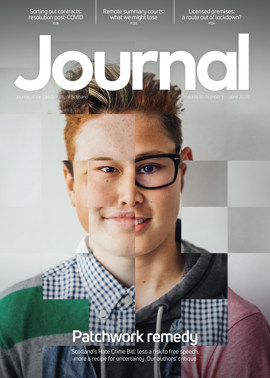Editorial: June 2020
The first requirement for a society to live by the rule of law is respect for the law. Such respect was maintained pretty well over the first two months-plus of the COVID-19 lockdown, as people by and large stayed at home, observed social distancing and the rest.
Then we had the Dominic Cummings affair. The Government’s insistence on defending the indefensible was only ever going to have one outcome – an “If he can do it, so can I” attitude which, combined with modest official relaxations of the rules (done with little sign of coherent planning) and some fine weather, has meant that so far as many people are concerned, the rules might as well no longer be there. So much for the Government trusting in “the common sense of the British people”. And the anguish of NHS and care workers expecting a fresh wave of infection, and of those who still need to self-isolate, goes largely unheard.
Even in Scotland, with the partial shield of the Scottish Government’s cautious approach to easing the restrictions, observance is slipping away. People cannot be blamed for feeling it has all gone on for long enough, and if those at the top fail to give a clear steer, part of which must be being seen to lead by example, controls are bound to unravel.
Nor do we have that transparency in Government (in either capital) which might help to encourage trust. The defensiveness over the transfers of hospital patients to care homes, for example, and the attempts to conceal what was known at an early stage of the crisis, undermine rather than inspire confidence.
We are a long way, then, from realising the approach advocated by the Scottish Human Rights Commission in its papers on laying the foundations for economic recovery, which could equally be applied in other contexts. “In the context of COVID-19, human rights standards and principles provide a means of taking transparent, accountable and participative decisions that require the balancing of competing interests and priorities, at a time when trust and public confidence is both fragile and critical,” it states. “With the wide and meaningful participation of rights-holders, the Government would explore the necessary law, policy and budgetary resources required to improve rights realisation gradually, and in accordance with Scotland’s fiscal envelope.”
Devolution provides the opportunity to do things differently. That involves a measure of boldness and strategic thinking that is particularly needed at this time. That in turn needs the public to buy in to the chosen path, which they will do the more readily if they feel they have been given the chance to help lay it. If Westminster is failing to command respect, can Edinburgh show the necessary initiative?






